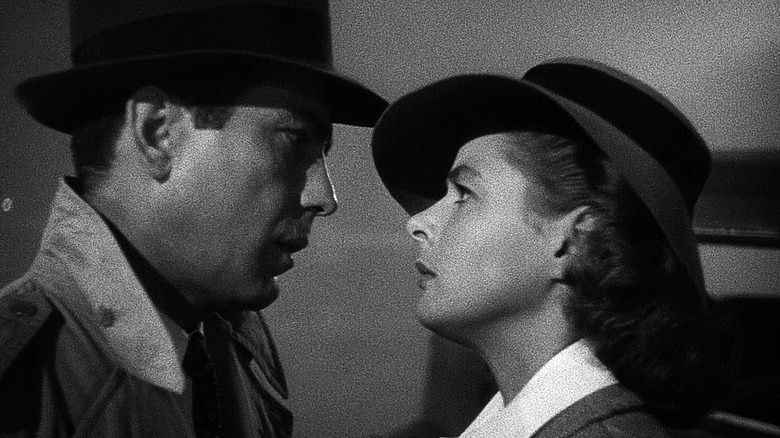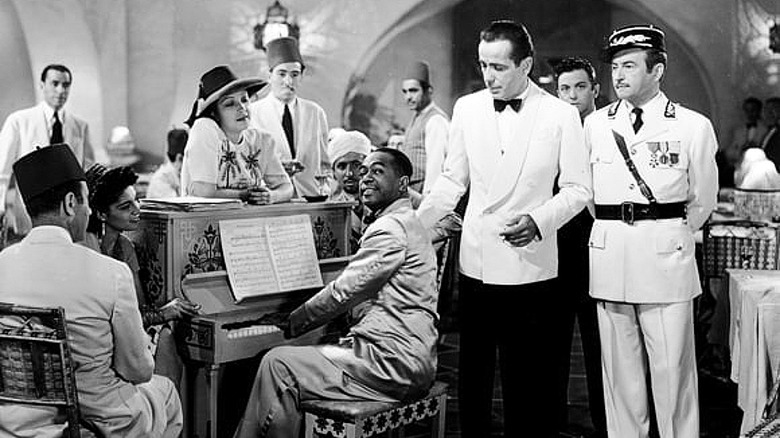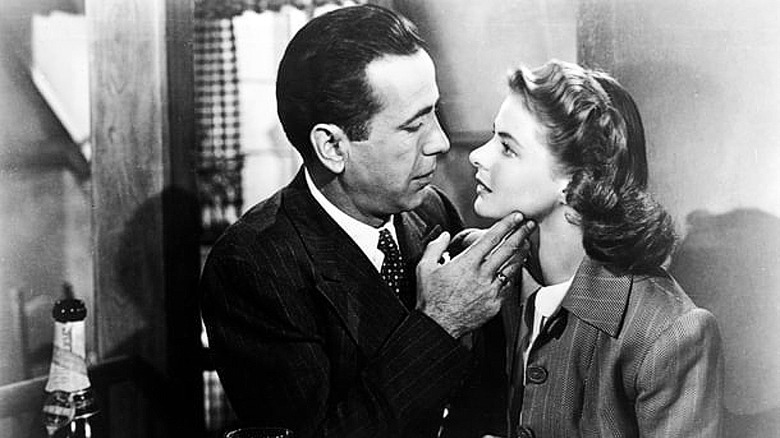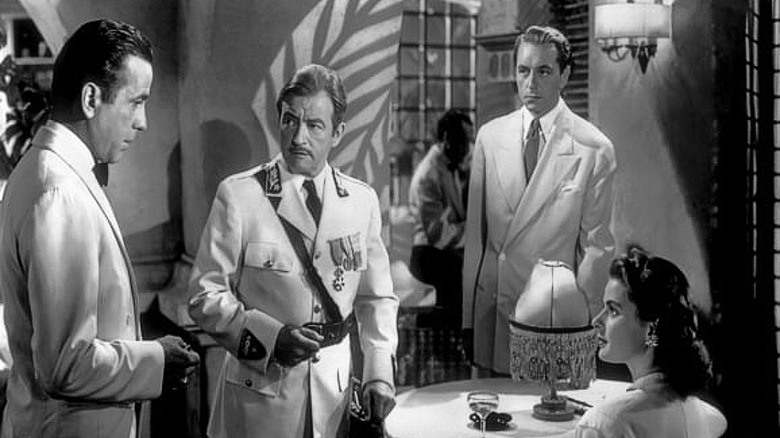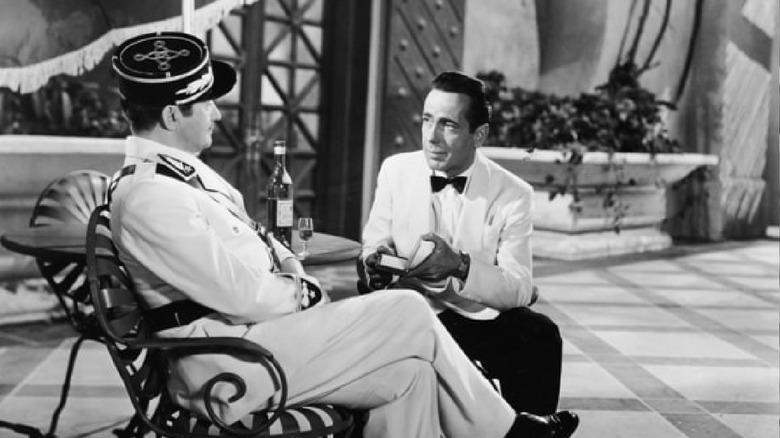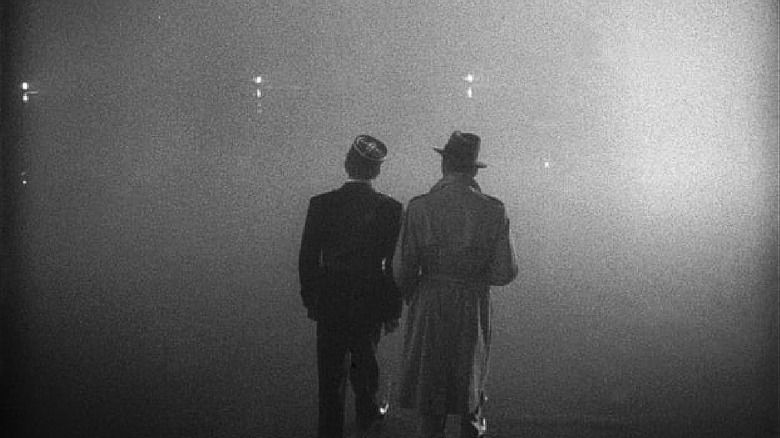Casablanca Ending Explained: The Conclusion Of A Dizzying Romance, And The Beginning Of A Beautiful Friendship
"Louis, I think this is the beginning of a beautiful friendship." It's the perfect line to end the perfect movie. If I'm ever pressed to name my favorite film of all time, out of all the hundreds I absolutely adore, "Casablanca" is the title I usually throw out there. It's a timeless classic built around the silver screen auras of Humphrey Bogart and Ingrid Bergman at their most worldly and cinematic, and it epitomizes the term "movie magic."
Some killjoys might dismiss it as wartime propaganda, released at a time when the U.S. had just entered World War II. However, thanks to the richly detailed screenplay and unforgettable performances all the way down the cast list, it's far more than that. It's a film about letting the past go, doing the right thing, making sacrifices, and getting older and wiser. It's a film full of grown-ups making adult decisions. Even the corniest lines sound right and true coming from the mouths of these people, and the older I get, the more the film resonates with me.
I love the way "Casablanca" looks, with its exotic locale and the noir-ish backdrop of Rick's Café Américain. I love the characters, the setting, the music, the dialogue, and the way these wonderful actors all play off one another. It's a film I enjoy showing to friends for the first time, especially those who think old black and white movies are boring. They are always surprised by how funny and entertaining it is.
"Casablanca" breezes by so enjoyably that a lot of the background information and plot details can sometimes feel like they get a little lost in the mix, especially as we get into its classic final scene. Let's dig into the ending in a bit more detail.
So What Happens in Casablanca Again?
It's December 1941 in Casablanca, Morocco. The city is under Vichy rule, headed by the cheerfully corrupt chief of police, Louis Renault (Claude Rains). The most popular night spot in town is Rick's Café Américain, run by the cynical, exiled expat Rick Blaine (Bogart), a man who rocks a white tux, smokes a lot, and trades flirtatious witticisms with Renault. His joint has it all: great tunes, strong drinks, a casino, international clientele, and an air of intrigue, sex, and danger that ensures every night is the most memorable of your life. It's also the last stop for refugees seeking passage to neutral countries like America, frequented by people gambling far more than money at the roulette table.
Things heat up when a crooked regular, Ugarte (Peter Lorre) obtains two "letters of transit" from murdered German couriers. These MacGuffin-ish letters promise no-questions-asked travel around Nazi-occupied Europe and to neutral Portugal and beyond. Ugarte leaves the letters in Rick's possession before he is arrested and suspiciously dies in custody.
Rick says he is totally neutral in all matters, but that is sorely tested when Ilsa Lund (Bergman), an old flame from his days in Paris, turns up with her husband, Viktor Laszlo (Paul Henreid), an influential resistance leader on the run from the Nazis. They are seeking the letters so Laszlo can escape torture and almost certain death in the concentration camps. Also in town is Major Strasser (Conrad Veidt), the Nazi officer in charge of preventing Laszlo's flight.
Years before, Ilsa ran out on Rick after a whirlwind romance and broke his heart. Now, with Laszlo's fate in the balance, will Rick put his bitterness to one side? Or will he sell Laszlo out and whisk Ilsa away instead?
Here's Looking at You, Kid
Going into the final scene, Rick has it all set up so Captain Renault thinks he's going to betray Laszlo and use the letters to take Ilsa away to America. He has also told Ilsa that when Laszlo gets on the plane to Lisbon, she will stay in Casablanca with him. But Rick has other ideas on both counts. When Renault shows up at the cafe to arrest Laszlo, Rick pulls a gun and forces him to accompany them to the airport. Once there, he instructs Renault to fill in the letters of transit with the names Mr. & Mrs. Viktor Laszlo.
Ilsa is distraught, but Rick persuades her to get on the plane with talk of hills of beans and the threat they would both face if they stayed in Casablanca. He then explains the situation to Laszlo, who welcomes him "back to the fight." This line seems directed at the American audience of the time, many of whom had opposed joining the war just a few years earlier (via U.S. Holocaust Memorial Museum). Like America, Rick was determinedly neutral at the beginning of the film, but this group of European characters awaken his conscience until he is finally ready to "stick his neck out" and join the fight against Nazi Germany by helping Laszlo get away.
Another point of interest is whether Rick would return to America if he had chosen to double-cross Laszlo. Throughout the film it is hinted that Rick is exiled from the States, although the screenwriters never explicitly state why. The biggest clue comes during Renault's summary of Rick's previous activities:
"In 1935, you ran guns to Ethiopia. In 1936, you fought in Spain on the loyalist side."
Running guns in Ethiopia would have violated America's Neutrality Act, passed in 1935, which forbade the "export of arms, ammunition, and implements of war to belligerent nations." Violators faced fines of up to $10,000 and/or five years in jail. As for Rick's time in Spain, it is most likely that he worked for a volunteer group like the Lincoln Battalion, who fought against General Franco's Nazi-backed forces. This would have also violated the neutrality law, although in practice the U.S. government chose not to prosecute volunteers because the public were against it. Either way, life was made difficult for American veterans of the Spanish Civil War, some of whom were later blacklisted by the House of Un-American Activities Committee and generally persecuted as communists (via ALBA).
Round Up the Usual Suspects
As the plane is about to leave, Major Strasser arrives on Renault's tip off. Strasser tries to stop the plane by phoning the radio tower, but Rick shoots him dead. The police arrive and, after a moment's hesitation, Renault tells his underlings to "round up the usual suspects."
The line always gets a laugh from audiences, but it really underlines just how corrupt Renault is. He is the true villain of the piece, a completely amoral man who repeatedly abuses his power, to the point where it is almost a running gag throughout the film. Another moment that gets people chuckling is when he shuts down Rick's for illegal gambling while shamelessly collecting his winnings from the roulette table. Ugarte dies suspiciously in his custody, and we find out that he routinely extorts young women for sex with the promise of exit visas.
Renault is a thoroughly despicable character, but he usually gets a pass because Claude Rains makes him so charming and funny, and he does the right thing in the end by shielding Rick. But does he do it because he actually cares for Rick, or through necessity? After all, when the police roll up, Rick still has a gun and has proven he is willing to use it.
With the plane gone and Renault's men off to frame some poor suckers for Strasser's murder, Renault says it might be a good idea for Rick to skip town, suggesting a trip to the Free French garrison in Brazzaville. According to the BBC, Brazzaville was the capital of French Equatorial Africa and temporarily of Free France, Charles De Gaulle's government-in-exile.
A Beautiful Friendship
Renault clearly plans to go to Brazzaville with Rick, using the 10,000 francs he owes him from their bet on Laszlo's escape as expenses. It's probably a smart move on Renault's part, because Nazi reprisals for Strasser's killing are likely to be swift and brutal. In Brazaville, around 3,000 miles southeast of Casablanca, a schemer like Renault would no doubt reframe his involvement in the Laszlo-Strasser affair to make himself look like a hero, playing up his assist of Laszlo's escape before getting Strasser's assassin out of the country.
As for Rick, he'd probably have to go along with the story for the time being, and grow eyes in the back of his head. Renault is clearly not a man to be trusted, and Rick would potentially be able to incriminate the police chief for his misdeeds back in Casablanca. Meanwhile, Brazzaville may come as a bit of a culture shock to Rick after running a chic nightspot in relatively upscale Casablanca. As Richard E. Osborne describes the country in "The Casablanca Companion":
French Equatorial Africa was a poor and primitive land with an estimated 3.5 million inhabitants. Roads were made of dirt, or at best, gravel, and the only railroads ran from the seaports to the areas that produced lumber, rubber and gold...Tropical diseases were widespread and in some areas up to 50 percent of the population suffered from trypanosomiasis.
Hey, at least it would be a place for Rick to hunker down until the war ended. Unless, of course, his appetite for fighting the bad guys was truly whetted again and he found other ways to take on the Nazis...
Casablanca 2
If "Casablanca" was released today, I can imagine some modern viewers criticizing its ending as an obvious set-up for a sequel. Sequels weren't such a big thing back in the '40s, but there was buzz about a potential "Casablanca 2" as soon as the film became a success. As The Midland Journal reported on February 19, 1943:
"Casablanca" has scored such a hit that there'll be a sequel to it, "Brazzaville"; Humphrey Bogart and Sydney Greenstreet will continue their characterizations from the first film, and it's likely that Geraldine Fitzgerald will have an important role.
The story proposal came from Frederick Stephani, who had written the "Flash Gordon" serial for Universal. His treatment had Rick and Louis working as secret agents for the Allies in Casablanca. Rick goes off on a spy mission to Tangier to infiltrate a Nazi spy ring who are feeding vital shipping information to German subs hunting in the Strait of Gibraltar. As part of his plan, Rick opens another gambling house as cover and gets himself involved with a beautiful Nazi agent. Then, of course, Ilsa turns up...
A script treatment for a belated sequel emerged in 2012. Written by Howard Koch, it was entitled "Return to Casablanca" and would have featured Ilsa and Laszlo returning to North Africa to find Rick after he has joined the Free French troops fighting the Nazis. The story apparently centered around Ilsa's 20-something-year-old son, whose real dad is Rick.
Despite the rumors, thankfully no sequel appeared. There has been occasional talk of a remake, the scariest of which was the brainchild of Madonna, who wanted to set it in Iraq. And the less said about 1996's "Barb Wire," which ripped off the plot of "Casablanca" with Pamela Anderson in the Rick role, the better...
